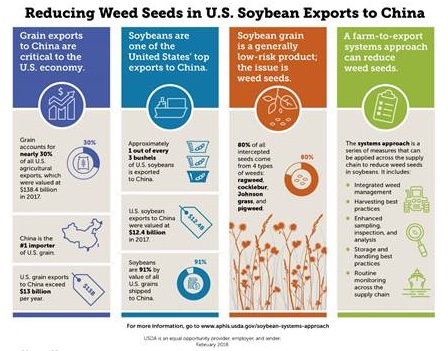Author: Osama El-Lissy Deputy Administrator Plant Protection and Quarantine
In 2016, Chinese officials put in place a new grain import law to keep invasive weeds and other plant pests from entering their country. Last fall, they informed USDA that U.S. grain shipments, particularly soybeans, did not comply with the new law. They specifically cited increased detections of weed seeds.

Reducing Weed Seeds in U.S. Soybean Exports to China
These weed seeds threaten U.S. access to China’s grain market. If we do nothing, the United States may lose this valuable market. Consider: Approximately 1 of every 3 bushels of U.S. soybean are shipped to China, making it the United States’ largest market for this commodity. In 2017, this export was valued at $12.4 billion, which is approximately 91% by value of all grains shipped to China.
To maintain access and ensure uninterrupted soybean trade with China, my agency, USDA’s Animal and Plant Health Inspection Service (APHIS), has worked with U.S. industry groups and other USDA agencies to develop a holistic farm-to-export systems approach for reducing foreign material, including weed seeds, in soybean (please see the soybean systems approach infographic). We are currently working with these groups to create broad awareness across the soybean supply chain about this serious issue and the systems approach.
We need your help. U.S. soybean producers are some of the best in the world. But we still need to make sure they have all the tools they need to effectively control weeds during the growing season and minimize weeds seeds in harvested soybeans. We are asking you and the agents in your coverage area to help producers strengthen their integrated weed management programs and further reduce the presence of weed seeds in harvested soybeans, especially for four common weeds: ragweed, pigweed, Johnsongrass, and cocklebur. These weed species represent 80% of all weed seeds detected by China in U.S. soybean. You will find a detailed checklist of recommended weed management practices on the APHIS web site that can help reduce weed seed contamination during planting, throughout the production season, and at harvest.
Soybeans are critical to the U.S. economy. Other countries are already taking steps to reduce weeds seeds in their soybeans. Your efforts to help producers further reduce weed seeds in harvested soybeans will not only ensure that U.S. soybeans continue to meet China’s import requirements, they will also enhance their value, making them even more competitive in the global marketplace.
If you have questions or would like additional information about the systems approach or the impact of weed seeds on grain trade, please contact George Galasso, APHIS National Trade Director for Grain by phone at (301) 851-2050 or by email at George.J.Galasso@aphis.usda.gov. For more information about specific recommended weed management practices, please contact Dr. Wendy Jin, APHIS Associate Executive Director by phone at (919) 855-7430 or by email at Wendy.Jin@aphis.usda.gov.
Thank you for your attention to this important issue.


